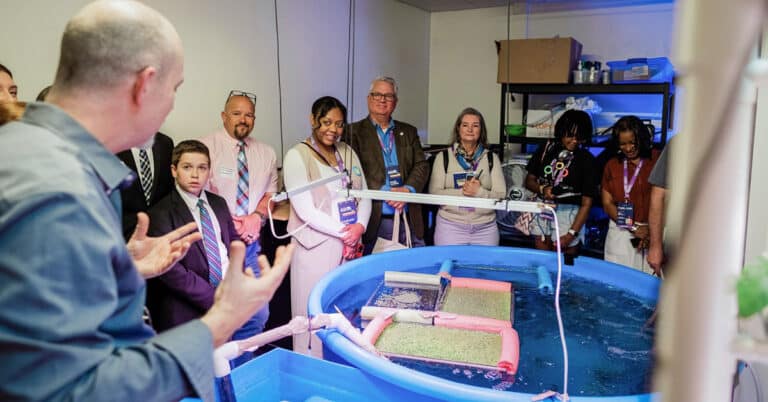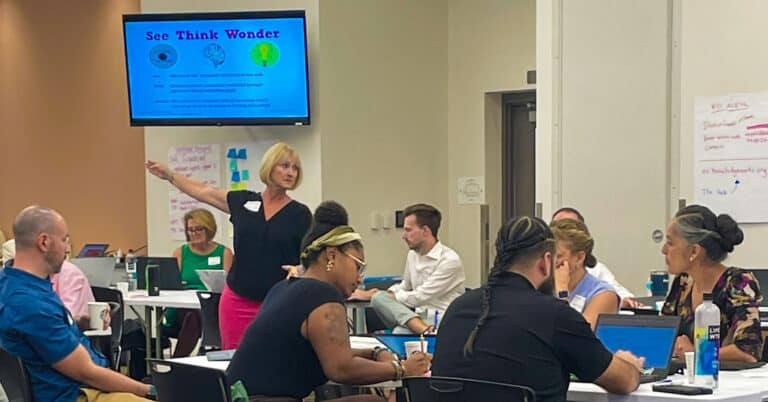Education systems shine when they are able to identify and address a community’s specific needs. To make this kind of approach work, districts need to offer culturally responsive services that are responsive to both the individuals and communities they serve.
Throughout Ohio, districts are focusing on whole child principles to create more equitable, responsive learning environments for their students. In partnership with local businesses and health agencies, these districts have created tailored programs that provide their students support where they need it most.
A whole child-focused approach to education has the power to transform the lives of students and their families. Through this approach, schools across Ohio are becoming centers of safety and positivity, where students trust that their needs will be honored and cared for, that they will be challenged to be their best selves personally and academically and that they will be supported no matter their background or circumstances.
KnowledgeWorks is committed to building a learning culture where schools, districts, social service agencies, health care providers, community organizations and others work together to ensure that young people in their communities have every opportunity to thrive.
This story is one in a thematic series that highlights the strategic and practical considerations, challenges and success factors that characterize efforts to comprehensively meet the needs of children in and out of the classroom. Centering on the experiences of six districts located in a diverse array of Ohio communities, these stories show what is possible when we care for our students as people while fulfilling the educational mission of our schools.
Addressing students’ basic needs
For students to come to school ready to learn and thrive, their needs must be met on a fundamental level. Students need to be clothed, fed, well-rested and unburdened from any physical or emotional harm. While addressing some of these physical necessities may seem straightforward, ensuring that all of a student’s fundamental needs are met requires education leaders to take a comprehensive approach.
In southeast Ohio, Alexander Local Schools leaders recognized that many families in the district needed more, and more accessible, supports for their children. Many families in this area are far from opportunity and face unique challenges in ensuring financial stability for their families. To address barriers to learning, the district partnered with local health centers and social service agencies to provide wraparound services that are easy for families to access.
Alexander Local Schools provides multiple levels of support to address their students’ needs:
- Onsite health practitioners and counselors that are available to the whole family
- Take-home backpacks filled with food for the weekend
- A free resource center for students to select clothes, toiletries and other basic necessities needed at home and at school
- Sensory rooms for students who need space to de-escalate when they are overwhelmed by their emotions
Designing school districts as community hubs
An essential objective of whole child principles is to strengthen the capacity of families and communities to support their children, which ultimately boosts students’ learning outcomes. To that end, one method that Ohio school districts have adopted is to offer everyday services at or near their campuses. Because of their existing connections within the communities they serve, school districts are uniquely positioned to centralize these services, reducing the barriers for families and students that need access.
When Wickliffe City School District, outside of Cleveland, first proposed building a Family Resource Center on its campus, the community initially resisted due to concerns about lack of evidence. Using grant-funding, the district performed a feasibility study that showed a clear need and demand for whole child services. Now that it’s established, adults and community members make up a sizable proportion of the people the center serves. Additionally, since the creation of the center, student attendance has improved and participation in extracurricular activities has increased.
Services provided at the Wickliffe Family Resource Center:
- Primary health
- Mental health
- Women, Infant and Children (WIC) services
- Blood donation drives
- Free drivers education courses
- Tax filing services
- FAFSA support
Get the full story
Ohio’s whole child-focused approach to education has the power to transform the lives of students and their families. Learn how districts in the state:






